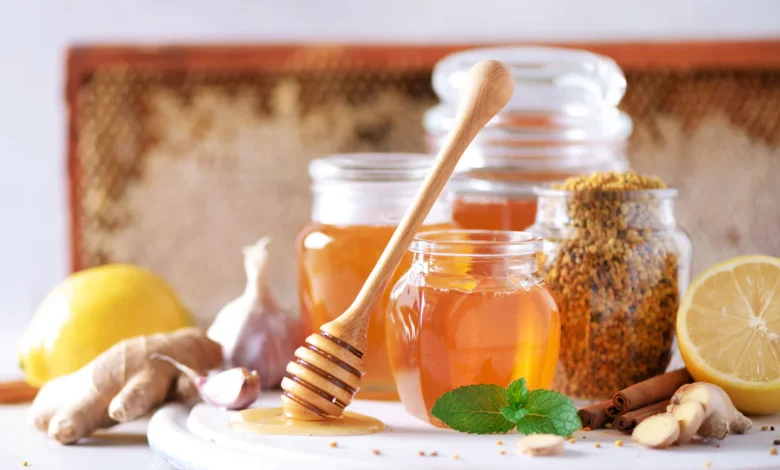HONEY: struggling with sickness? be happy, this is great and exciting news!

Honey is an all-natural and readily available option with many potential health benefits. It has been used as a natural remedy for centuries, and recent scientific research has shed light on some of its remarkable properties.
honey One of the most exciting potential benefits of honey is its ability to help prevent and manage metabolic syndrome (MetS). MetS is a cluster of risk factors that increase the risk of heart disease and diabetes, including a large waistline, high blood pressure, high triglycerides, low HDL cholesterol, and high blood sugar.

To be diagnosed with MetS, an individual must have at least three of these five conditions. Emerging evidence suggests that honey may be an effective tool in both preventing and managing MetS. One of the key ways it may help is by keeping blood sugar levels in check. Honey has a lower glycemic index (GI) than regular sugar, meaning it does not cause the same rapid spike in blood sugar and insulin levels.
This can be particularly beneficial for individuals with insulin resistance or prediabetes, as it helps to prevent the dramatic blood sugar fluctuations that can contribute to the development of MetS. In addition to its effects on blood sugar, honey may also have other beneficial impacts on the various components of MetS.
Some studies have found that honey can help lower blood pressure, improve cholesterol levels, and reduce inflammation – all of which are important factors in the development and management of this metabolic disorder. The potential benefits of honey extend beyond just MetS.
Research has also indicated that honey may help reduce the risk of heart disease and support a healthy gut microbiome. Some studies have even suggested that honey may be a viable alternative to antibiotics in certain applications, though more research is still needed in this area.
Honey’s versatility as a natural, readily available, and potentially health-promoting substance makes it an intriguing option for those seeking to improve their overall well-being. As with any dietary or health-related changes, it’s important to consult with a healthcare professional before incorporating honey or any other new products into one’s regimen.
Table of Contents
But the growing body of scientific evidence on honey’s benefits certainly suggests that this ancient natural sweetener may have an important role to play in modern-day health and wellness. Remarkable Health Benefits Honey is a remarkable natural substance with a wide range of potential health benefits.
Research has shown that honey can be a valuable addition to a healthy diet and lifestyle. Sensitivity and Weight Management: unique composition makes it a versatile ingredient that can be enjoyed by people with various dietary needs and sensitivities. For example, studies have found that honey can prevent weight gain if consumed in moderation.
This is likely due to honey’s effects on lipid metabolism. Improving Lipid Metabolism: Honey has been shown to lower blood levels of harmful triglycerides and LDL (“bad”) cholesterol while increasing levels of HDL (“good”) cholesterol. This is an important benefit, as high total cholesterol levels can contribute to the buildup of plaque in the arteries, a condition known as atherosclerosis.
This plaque buildup can harden over time and restrict blood flow, leading to an increased risk of heart disease and related complications like angina and heart attack. Reducing Oxidative Stress: is rich in antioxidants that help neutralize cell-damaging free radicals. This antioxidative property of it can help reduce the oxidative stress that is thought to play a role in the development of various chronic diseases, including cardiovascular disease.
Cardiovascular Disease Prevention: Honey’s unique chemical composition, which includes natural sugars, vitamins, minerals, and beneficial plant compounds called phytochemicals, may contribute to its cardioprotective effects. The antioxidant and anti-inflammatory properties of it compounds can help protect against the development of atherosclerosis, a key risk factor for coronary artery disease (CAD).
Antibiotic Resistance and Respiratory Health: may also offer a potential solution to the growing problem of antibiotic resistance. A recent review found that honey can be effective in improving cough frequency and severity, compared to over-the-counter medications and even antibiotics. This is particularly relevant given the concerns around the overuse of antibiotics for upper respiratory tract infections (URIs), which has contributed to the rise of antimicrobial resistance.

In conclusion, diverse array of beneficial properties, ranging from weight management and lipid profile improvement to cardiovascular disease prevention and respiratory health support, make it a valuable natural resource that deserves further exploration and utilization in the pursuit of better health outcomes. Original passage: responding to treatments.
That’s a great concern because it limits the treatment options for URIs and other infections. A study published found that honey may hold the key to curbing antimicrobial resistance. The researchers discovered that an antimicrobial compound from honeybees could become the basis for new antibiotics. The growing problem of antimicrobial resistance is a significant public health concern worldwide.
As more and more bacteria and other pathogens become resistant to existing antibiotics, healthcare providers are finding it increasingly difficult to treat common infections effectively. This is a particularly worrying trend for upper respiratory infections (URIs) such as the common cold, as it limits the treatment options available and can lead to more severe and prolonged illness.
In light of this pressing issue, a recent study has provided a glimmer of hope. The researchers explored the potential of honey, a natural substance long used in traditional medicine, to combat antimicrobial resistance. Their findings were quite remarkable – they discovered that a specific antimicrobial compound produced by honeybees could serve as the foundation for developing new, more effective antibiotics.
The study’s authors believe that by harnessing the unique properties of this honey-derived compound, it may be possible to circumvent the mechanisms that allow pathogens to develop resistance to conventional antibiotics.
This could pave the way for a new generation of antimicrobial agents capable of overcoming the growing challenge of drug-resistant infections, including those that commonly cause URIs and other widespread illnesses.
The researchers emphasized that further investigation is needed to fully understand the underlying mechanisms and potential clinical applications of this promising discovery. Nevertheless, the prospect of leveraging the natural defenses of honeybees to combat the global crisis of antimicrobial resistance has generated significant excitement within the scientific community and holds the promise of providing much-needed solutions in the years to come.
Supports a Healthy Gut Honey has been the subject of extensive research in recent years, and one of the key findings is its potential prebiotic properties. A comprehensive review published in 2017 highlighted that honey can serve as a prebiotic, which means it helps to nurture and support the growth of beneficial gut bacteria.
This is particularly significant as the gut microbiome plays a crucial role in maintaining overall health and well-being. The review highlighted that honey’s prebiotic effects can specifically promote the growth of Lactobacilli, a type of “good” bacteria that is essential for breaking down food and facilitating the absorption of vital nutrients.

This is particularly relevant for individuals struggling with conditions like irritable bowel syndrome (IBS), as research has shown that supplementing with Lactobacilli can help alleviate symptoms such as diarrhea. The researchers further linked the prebiotic effects of it to a stronger immune system and enhanced mental well-being, underscoring the far-reaching benefits of maintaining a healthy gut.
In addition to its use as a natural sweetener, has a wide range of medicinal and therapeutic properties that have been recognized for centuries. Honey is particularly valued for its anti-inflammatory, antioxidant, and antibacterial properties, making it a versatile and effective natural remedy.
One of the primary uses of honey is as an oral treatment for coughs and sore throats. The thick, viscous nature of honey coats and soothes the throat, while its antibacterial properties can help to reduce inflammation and fight off any underlying infections. Studies have shown that it can be as effective as over-the-counter cough suppressants, with the added benefit of being a natural and gentle alternative.
Topically, it is commonly used to treat burns and promote wound healing. The antibacterial and anti-inflammatory properties of honey help to prevent infection and reduce swelling, while its unique composition, which includes hydrogen peroxide, helps to create an optimal healing environment. Honey has been used for centuries in traditional medicine to treat a wide range of skin conditions, from minor cuts and scrapes to more serious burns and ulcers.
In addition to its medicinal uses, also a potent antioxidant, containing a variety of phenolic compounds that can help to neutralize free radicals and protect the body’s cells from damage. This makes honey a valuable addition to a healthy, balanced diet, as it can help to support overall immune function and reduce the risk of chronic diseases.
Overall, the versatility and effectiveness of honey as a natural remedy make it a valuable addition to any household. Whether used orally to treat coughs and sore throats or topically to promote wound healing, honey’s unique properties make it a powerful and practical tool for maintaining good health.




